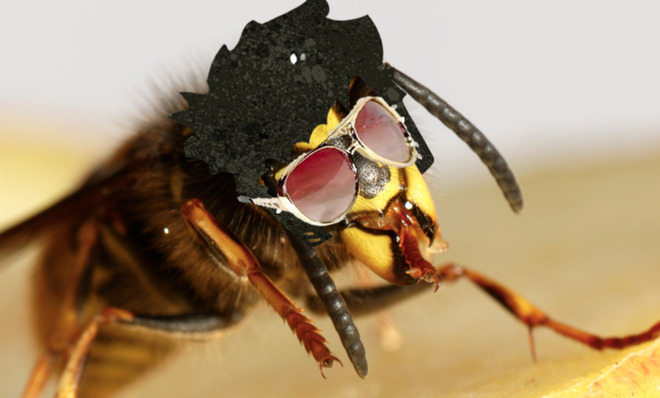How some bugs are like bad Elvis impersonators
For many species, mimicry is the key to survival. Good thing they don't have to be all that great at it.

A free daily email with the biggest news stories of the day – and the best features from TheWeek.com
You are now subscribed
Your newsletter sign-up was successful
If you're an Elvis impersonator, your impression better be pretty spot-on if you want to avoid getting heckled by the audience. But if you're any one of a number of animals that mimic other species to survive, a poor impression can mean death. Thankfully, a new study suggests that nature can be pretty forgiving of an imperfect imitation.
Some animals defend themselves from predators through what biologists call Batesian mimicry: they take on the appearance of another prey species that's poisonous, dangerous in some other way, or just plain unpalatable. Predators avoid the model species for good reason, as well as the harmless mimic — fooled by a sheep in wolf's clothing.
Not getting eaten is a pretty strong evolutionary pressure, so you would think that the similarities between mimic and model would be close. But there are lots of poor mimics out there, and strangely enough they don't seem to suffer for their sloppy disguise. Take the various flies that mimic wasps, for example. Some leave a lot to be desired: they're too small, or the stripes aren't quite right, or their bodies are the incorrect shape. There are also a number of harmless snakes that imitate the potently venomous eastern coral snake by sporting the same black, yellow and red skin — but the "false corals" often get the sequence of colors or the width of the bands wrong.
The Week
Escape your echo chamber. Get the facts behind the news, plus analysis from multiple perspectives.

Sign up for The Week's Free Newsletters
From our morning news briefing to a weekly Good News Newsletter, get the best of The Week delivered directly to your inbox.
From our morning news briefing to a weekly Good News Newsletter, get the best of The Week delivered directly to your inbox.
How these imperfect mimics get by has puzzled scientists for a while, and there's no shortage of ideas to explain their success. One hypothesis is that poor mimics only appear poor to human eyes — a predator with a slightly different vision system is fooled. Another idea is that some poor mimics aren't limiting themselves to imitating perfectly the appearance of one model, instead approximating the looks of several to get protection from different predators.
There are plenty of other ideas, but a team of researchers in Sweden, led by zoologist Baharan Kazemi, says that most of these explanations assume too much of predators. Kazemi and her colleagues think that instead of comparing the general likeness of model and mimic, predators use only one or two important characteristics — like color or pattern — to discriminate actual harmful prey from the fakers. Other traits get ignored, which means there's less pressure to mimic them well.
To test their ideas, the researchers set up an experiment with wild blue tits as predators and laminated pieces of paper as "prey." All of the prey items had three prominent traits: color, pattern, and shape (a blue triangle with two dots, for example). The birds were rewarded with a mealworm if they attacked a "safe" prey type, but didn't get a treat if they went after papers that stood in for inedible prey. All the birds quickly picked up on the difference.
Next, the researchers brought in the mimics, pieces of prey paper that either matched the inedible/unrewarded model in all three traits (a perfect mimic) or only one (an imperfect mimic). The birds avoided the perfect mimics and the color mimics, but attacked the pattern and shape mimics almost as much as they had the edible/rewarded prey.
A free daily email with the biggest news stories of the day – and the best features from TheWeek.com
The birds confirmed Kazemi's hypothesis that they are concerned primarily with one trait: color. A mimic that was imperfect, but got the color right, got the same protection as a perfect mimic. The ones that copied the size or shape of the model, but didn't match the color, would have quickly become bird food if they were real animals. And this wasn't just the case for one particular color-pattern-shape combination. The birds behaved the same way in several rounds of experiments with different rewarded and unrewarded prey types.
Researchers think this is because color is generally important to the birds and they're good at distinguishing it. They need to be able to discriminate objects at a distance during flight, which is why they have well-developed color vision. When the researchers tested the tits to see how quickly they could distinguish differences in the three traits, they learned all of them easily, but color was learned faster than the other two.
If Kazemi's results hold true for other animals, then mimics only need to nail that one aspect of their look. As long as they copy the right trait, they can slack on the rest and get by with impersonations that are just good enough.
-
 How to Get to Heaven from Belfast: a ‘highly entertaining ride’
How to Get to Heaven from Belfast: a ‘highly entertaining ride’The Week Recommends Mystery-comedy from the creator of Derry Girls should be ‘your new binge-watch’
-
 The 8 best TV shows of the 1960s
The 8 best TV shows of the 1960sThe standout shows of this decade take viewers from outer space to the Wild West
-
 Microdramas are booming
Microdramas are boomingUnder the radar Scroll to watch a whole movie